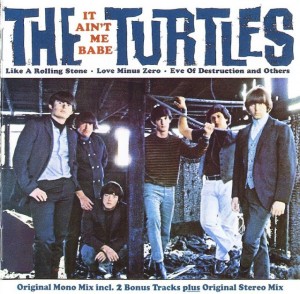 From the MCRFB NEWS archive: 1965
From the MCRFB NEWS archive: 1965
West Coast Clamors For Dylan Tunes
HOLLYWOOD — West Coast recording companies are rushing to cut Bob Dylan songs, with his message-protest numbers all but killing surfing, hot-rod, and all other teen-age themed topics in recorded numbers this Summer.
California-based Music Publishers Holding Corporation head Jack Maas reveal that 48 different Dylan records have been cut within the past month, have either been released, or will be cut in the next several months. Many of the Dylan songs are ‘covers’ of hits already having found their way on the current national charts.

“Most of Dylan’s materials has been requested and recorded by West Coast companies,” Mass said. The reason he attributes to this West Coast activities is simply that young a&r men here have latched unto Dylan with more enthusiasm than their Eastern confreres.
Among these “young” producers, Maas names Steve Douglas and Dave Axelrod at Capitol; Gary Usher, Decca; Andy DiMartino, Liberty Records; Al Schmitt, RCA; Dick Glasser, Warner Bros.; Bud Dain, Crescendo; Terry Melcher, Columbia; Herb Alpert, A&M Records.
“In all my years as a publisher, I’ve never seen such activity for demand for one writer,” Mass emphasized. “I’ve got people constantly calling me for his material!”
There are currently seven Dylan tunes on the charts, and the movement is moving forward for the new folk-rock sound, which began with the Byrd’s single, “Mr. Tambourine Man,” and then the avalanche for Dylan songs began.
MPHC has a total of 80 Dylan songs and 12 new songs the folk-singer just cut for a new Columbia long-playing album. All of Dylan’s songs are published by M. Whitmark & Son, an MPHC company.
Just released are the following Dylan tunes: “I Don’t Believe You,” by the Lincoln Greens, Crescendo; “Blowin’ In The Wind,” by Johnny Rivers, Imperial; “If You Gotta Go, Go Now,” by the Liverpool Five, RCA; “All I Really Want To Do,” and “Mr. Tambourine Man,” by Joe and Eddie in new Crescendo albums.
Set For Release

Soon-to-be-released Dylan tunes include “It Ain’t Me Babe,” “Like A Rolling Stone,” “Love Minus Zero” and “I Don’t Believe In You” by the Turtles in their first White Whale LP; “Chimes Of Freedom,” “Like A Rolling Stone,” “It Ain’t Me Babe” and “Mr. Tambourine Man” in a Dino, Desi and Billy Reprise LP; “Don’t Think Twice, It’s All Right” by Randy Boone in his Decca LP; “It Ain’t Me Babe,” “All I Really Want To Do,” “Like A Rolling Stone” and “You Were On My Mind” in a new Surfaris Decca LP; “Mr. Tambourine Man” and “All I Really Want To Do” in a new David Rose MGM LP; “All I Really Want To Do,” “Blowin’ In The Wind,” and “Don’t Think Twice, It’s All Right” in a forthcoming Cher Imperial LP; “Mr. Tambourine Man,” “Don’t Think Twice, It’s All Right,” “Love Minus Zero,” “All I Really Want To Do,” “Blowin’ In The Wind,” “She Belongs To Me” and “It Ain’t Me Babe” will be in Duane Eddy’s new Colpix LP.
Leroy Van Dyke’s first single for Warner Bros., is Dylan’s “It’s All Over Now Baby Blue.” Also, World Pacific is readying a new band (name undisclosed) which will debut an LP featuring 10 Dylan tunes, to be released near the end of the year.
Mass claims that teenagers are listening to the lyrics. Despite the heavy commercial rock n’ roll beat and the blasting overly amplified guitars, most in the music business tend to realize that the lyrical content of a song is getting through to young people, more in popularity in the current folk-music scene. The rock background, that in itself, has helped the singles get on Top 40 music stations. There are some skeptics who feel the kids are not quite listening to the words, but are rather phased by the new beat instead.
Dylan’s Columbia albums are loaded with message, protests, and satire songs, very cerebral and complex., which has not yet been “discovered” by the “long-haired” folk-rock performers as a preference of choice with today’s popular music.
Beach Boys on Chart
The Beach Boys are the only group represented on the charts with a summertime, teen-outdoorsy song with “California Girls.” All the West Coast beach-surf sound groups seemingly have been washed out to sea by the Dylan-influenced groups who have also begun imitating Dylan’s droning, monotonous vocal style.
Asked by Billboard to comment on the current rage to record message songs — some meaningful, some otherwise — folk singer Harry Belafonte said that folk music has always stressed social interests in protesting. Characteristics of the folk and rock idioms may be found in some established musicians as Odetta and Brownie McGee, Belafonte said. Folk and rock have their roots in Negro music,” Belafonte noted.
Today’s commercial folk singers may be compared to troubadours of yesterday, he said. The intensity of Negro music is part and parcel of the new sound reflecting the the world’s changing society, the entertainer continued.

Dylan’s overwhelming emergence as the chief procrastinator of the protest writers has all but obliterated other young folk-oriented writers who were created in this vein. This group includes Phil Ochs, Mark Spoelstra, Len Chandler, Richard and Mimi Larina and Pamela Poland. Paul F. Sloan has already gained notoriety for penning, “Eve Of Destruction,” a powerful single which has begun it’s climb up the charts.
The current trend has all but eliminated Caucasian groups from singing “let’s go to the hop-type songs.” The newest teen topic is protesting against a person’s abnormally long hair, and of social discords evidently present in our times. On the other hand, rhythm and blues’ artists and groups have not yet discovered Dylan and are yet still singing in their soulfully shouting style, with enough drums and rhythmic beat to satisfy their listeners with the current music trends. END
___
(Information and news source: Billboard; September 4, 1965)
![]()
